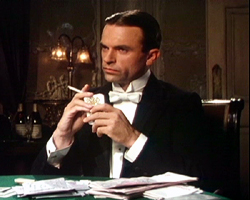| Reilly, Ace of Spies | |
|---|---|
 Sam Neill portraying Sidney Reilly in the television serial Reilly, Ace of Spies (1983). | |
| Based on | Ace of Spies by Robin Bruce Lockhart |
| Screenplay by | Troy Kennedy Martin |
| Directed by | Martin Campbell Jim Goddard |
| Starring | Sam Neill Jeananne Crowley Leo McKern Tom Bell Kenneth Cranham Norman Rodway |
| Theme music composer | Harry Rabinowitz Dmitri Shostakovich (main theme) |
| Country of origin | United Kingdom |
| Original language | English |
| No. of series | 1 |
| No. of episodes | 12 |
| Production | |
| Producers | Chris Burt Johnny Goodman Verity Lambert |
| Running time | 50 minutes |
| Production company | Euston Films for Thames |
| Original release | |
| Network | ITV |
| Release | 5 September – 16 November 1983 |
Reilly, Ace of Spies is a 1983 British television programme dramatizing the life of Sidney Reilly, a Russian-born adventurer who became one of the greatest spies ever to work for the United Kingdom and the British Empire. Among his exploits, in the early 20th century, were the infiltration of the German General Staff in 1917 and a near-overthrow of the Bolsheviks in 1918. His reputation with women was as legendary as his genius for espionage.
Contents
The series was written by Troy Kennedy Martin, and based on the 1967 book Ace of Spies by Robin Bruce Lockhart, whose father R. H. Bruce Lockhart was one of Reilly's fellow spies. [1] Sam Neill stars as the eponymous character. [2] The theme music is the romance movement from Dmitri Shostakovich's The Gadfly Suite, though Shostakovich is not actually credited (Harry Rabinowitz is credited with the music). [3] [4]